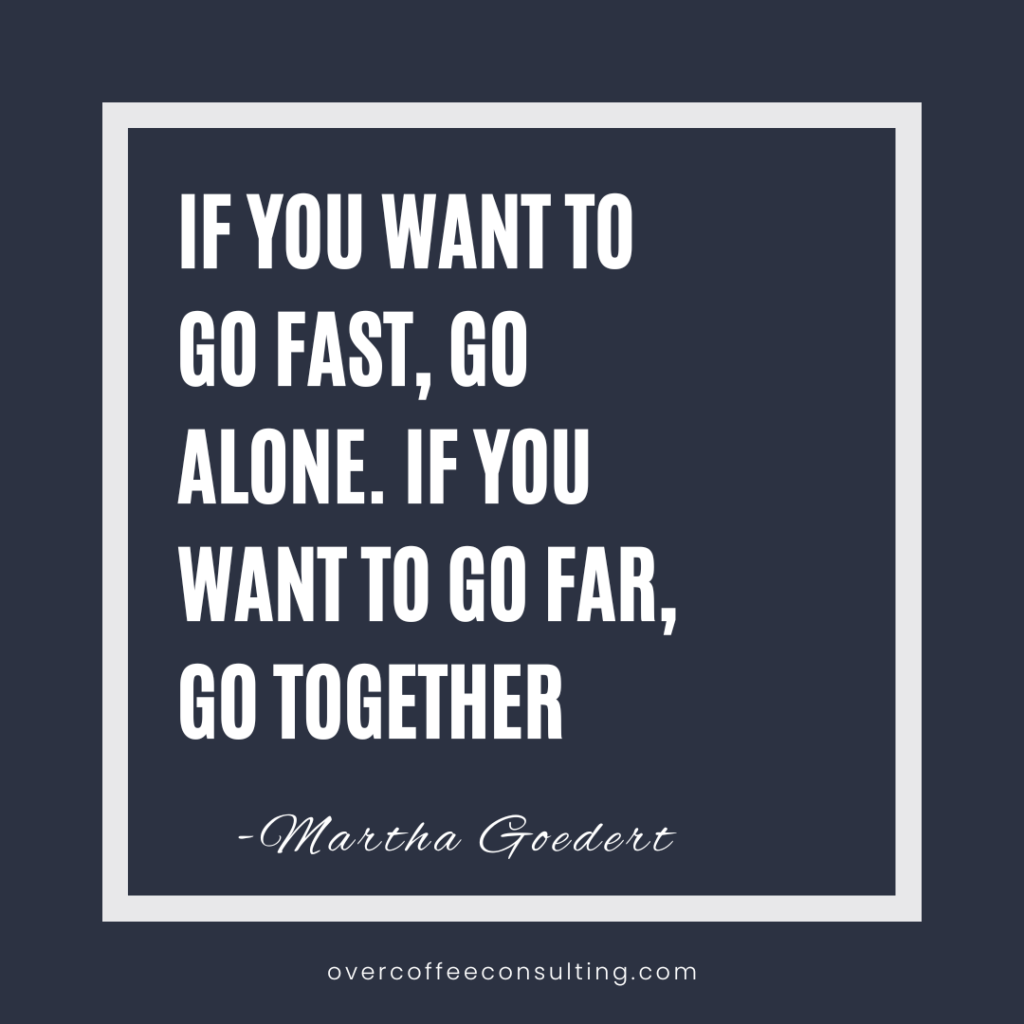Starting a business can be exciting, motivating, and overwhelming all at once. It is similar to having a baby. You give it life, nurture it, and you’re proud to watch it grow. And sometimes it’s easier to have a co-parent for this new life that always seems to need something from you. Some entrepreneurs like to go solo, while others choose to team up with a business partner or co-founder. At OverCoffee, we think it is incredibly helpful, and a lot more fun, to have a partner. But what type of business partner to choose?
This article will give you an overview of how and what type of business partner to choose. An African proverb from Martha Goedert says, “If you want to go fast, go alone. If you want to go far, go together.” See the proverb here and how it is related to what type of business partner to choose. This is why we recommend having a partner for a business startup. Having a business partner allows you to share the workload, split the financial costs, and make decisions together.

But what type of business partner to choose?
Table of Contents
Nowadays, just like any relationship, it takes time to find the right business partner. It will take a lot of tough decision-making. A business partner might break or build your success. So, choosing the right business partner is crucial for building a thriving business. Kristine and Paola, the founders of OverCoffee Consulting, are often asked how they met, and how they managed to maintain such a beautiful personal relationship and successful business. People are curious about what to look for in a partner when starting a business, how to divide work and responsibilities, and what makes a partnership work well.
Here are some key insights and tips on how and what type of business partner to choose and form a successful partnership:
1. Align on Values & Priorities
Aligned values are crucial even in any type of relationship. Whether it is with your life partner or business partner, aligned or misaligned values will define the success or failure of a relationship from day one. The values we are talking about here are things like excellence, fairness, integrity, and commitment. If you and your business partner have different definitions of what success looks like for your business or the customer experience you provide, you will constantly be clashing. Here are some questions that might help to ask each other:
- Why do you want to do this work?
- Do you fine-tune your work product until it is perfect every time or is good enough sometimes good enough?
- If a customer is unhappy, would you refund without question or stick to our contract?
- Is continuous learning/development/training for ourselves and our team important or not necessary?
- How would you decide how much to pay a new hire for our team? Are you willing to pay/invest top dollar or do you prefer to find the cheapest form of labor?
Understanding how your potential partner thinks about questions like this will help you get a feel for whether or not you are in alignment with values that are important to you.

Ultimately, Kristine and Paola believe that one of the main reasons for their successful partnership is their shared core values. They see a lot of issues the same way and strive to treat their team, their customers, and each other in a similar regard. This alignment ensures that they are often on the same page, especially when it comes to making important decisions.
2. Share Life Objectives/Priorities
In addition to having similar values, your priorities must align to ensure that one partner does not feel they are “outworking” the other or not getting their needs met. For instance, how you prioritize family and work time is incredibly important. If one partner thinks it is important to drop their kids off at school at 9 and pick them up at 3 before taking them to activities and cooking dinner, while the other partner focuses on work from 8-5 daily no matter what, there will be an imbalance of effort that will start to weigh on both partners over time. Some questions to flush out your priorities might include:
- How many hours per week or day do you want to work?
- What non-negotiables do you have when it comes to work/life balance?
- How important is the income that you bring home?
- Are there any significant phase of life changes coming up that might shift your priorities?
Answering questions like these helps to get a feel for the unspoken expectations each person brings to the partnership. If you feel there is a fundamental difference in how you prioritize the business itself and how it fits into each of your lives, you may want to rethink your partnership.

Aligning Life Goals Are Important In Choosing Your Business Partner
For Kristine and Paola’s business, family comes first and business is second. This doesn’t mean that they neglect their customers when family needs come up. It means that they step in for each other when one of them needs time to take care of a family need. It means they recognize the importance of communicating with clients ahead of time. They will be on vacation at the same time because protecting that family time is important, but they also don’t want to let their clients down. This shared priority means that they understand and respect each other’s needs and they step in or manage expectations appropriately. Having similar goals, aspirations, and boundaries helps them stay aligned and motivated.
Tip: Choose a business partner whose life objectives and priorities align with yours. This will help you both stay motivated and focused on your long-term goals, while also maintaining a healthy work-life balance.
3. Understand Each Other’s Strengths
Before you can form a successful partnership, you need to know your strengths and weaknesses. Your strengths are greater, and your weaknesses are more significant than you think. Keep in mind that collaboration isn’t just about adding resources together. The success of the business comes from understanding your unique skills, acknowledging your limitations, and finding someone whose abilities complement yours. In this part, you would know what type of business partner to choose.
At OverCoffee, we value each other’s strengths and make each other better. One of the things that drew Kristine and Paola together was the similarities of their backgrounds. They both had corporate careers in finance, achieved MBA degrees, and began consulting for startups and small businesses later in their careers. They are both natural problem solvers and can think big picture but also execute detailed tasks. However, Paola does a great job getting things started and Kristine appreciates getting that bump so she can edit and finalize. Another example of dividing and conquering was on their recent Marketing Retreat to San Miguel where Paola focused on the travel planning while Kristine focused on the session facilitation. Both of them felt their part was “easy” because it was something accessible in their wheelhouse.

Identify and Appreciate Each Other’s Strengths
They also understand their weaknesses and accept the fact that neither of them loves the monthly task of invoicing clients or doing tax preparation, so they sit down and do it together to make it less painful. Kristine and Paola also understand that it’s easy for both of them to ignore hard conversations, so they hold each other accountable for having them and provide encouragement when needed. By understanding and appreciating what each of them brings to the table, they can divide work and responsibilities effectively, ensuring that they both play to their strengths and support each other in their weaknesses.
Some questions you can ask:
- What part of work or the workday feels easy to you?
- What tasks could you get lost in because they are so fun or interesting?
- What part is really hard for you?
- What tasks do you procrastinate on because you really don’t want to do them or you don’t know how to get started or complete the job?
Tip: Take the time to understand your partner’s strengths and weaknesses. This will help you divide responsibilities in a way that maximizes your collective skills and talents, leading to a more efficient and effective partnership.
4. Love What You Do or Do What You Love
Having a business partner who shares your passion is incredibly important. It means you’re both equally invested in the journey and committed to the same vision. This mutual enthusiasm fosters a strong, supportive partnership where challenges are met with resilience and innovation. When you both love what you do, it creates a positive, dynamic work environment, making every step of the way enjoyable and rewarding. Passion is the fuel that drives success, and sharing it with your partner makes the whole process more fulfilling and effective.
Paola and Kristine love what they do and they love being able to have a happy team. Their passion for their work and commitment to creating a positive work environment are key factors in their success.
Some questions you can ask:
- What makes you want to do this work?
- What would you be doing if we didn’t have this company?
- What do you love about our clients or team?
- What does your ideal day look like?
Tip: Choose a partner who is passionate about the business and shares your enthusiasm. This will help you both stay motivated and engaged, even during challenging times.

5. Keep It Fun
When you both enjoy what you’re doing, it creates a positive and energetic work environment. This joy fuels creativity, motivation, and resilience, helping you navigate challenges more effectively. Sharing laughs and celebrating successes together strengthens your partnership, making the journey more rewarding and less stressful. Ultimately, fun at work enhances productivity and satisfaction, ensuring that both you and your business thrive.
Beyond work, they have a lot of fun doing the same activities and spending time together. They both love to travel, eat good food, and enjoy fun workouts like pickleball, pilates, and yoga. So they plan retreats, take clients to lunch, and network during all of their physical activities. Their families also enjoy hanging out so sometimes the kids swim and play and the husbands grill while they are on the phone with a developer solving a cybersecurity issue for a website! They have so much fun they can’t believe it’s called work.
Some questions you can ask:
- What do you do for fun?
- If nothing was tying you down, where would you go?
- How do you stay active?
- How do you like to spend your weekends?
Tip: Make sure that you and your partner can have fun together. Enjoying each other’s company and finding joy in your work will help you stay motivated and build a positive, resilient partnership.

Conclusion
Building a successful business partnership requires careful consideration of what type of business partner to choose and alignment on key aspects such as values, life objectives, strengths, and skills. Their partnership at OverCoffee Consulting is a testament to the power of finding the right partner and creating a supportive, fun, and productive working relationship.
They’re not just talking about work goals here; but also they’re talking about life stuff, like family and personal aspirations. Being on the same page about what matters most keeps them in sync, whether they are making big decisions or just grabbing a cup of coffee. But it’s not all serious business talk. They know how to have a good time, too. They’re all about finding joy in what they do and making sure the journey is as fun as it is rewarding.
They know that keeping things light and enjoyable is the secret sauce to a strong and beautiful partnership. And hey, when you genuinely love what you do and who you’re doing it with, it’s hard not to have a blast along the way!
If you’re struggling to find an ideal business partner, or if you and your business partner aren’t quite seeing eye to eye, reach out. We’d love to help brainstorm on how to help!



